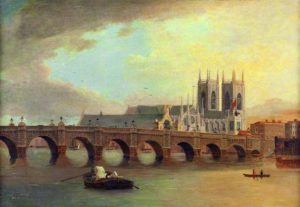Earth has not anything to show more fair:
Dull would he be of soul who could pass by
A sight so touching in its majesty:
This City now doth, like a garment, wear
The beauty of the morning; silent, bare,
Ships, towers, domes, theatres, and temples lie
Open unto the fields, and to the sky;
All bright and glittering in the smokeless air.
Never did sun more beautifully steep
In his first splendour, valley, rock, or hill;
Ne’er saw I, never felt, a calm so deep!
The river glideth at his own sweet will:
Dear God! The very houses seem asleep;
And all that mighty heart is lying still!
Early one morning, while on their way to visit friends in Calais, William Wordsworth and his sister Dorothy crossed over Westminster Bridge in London on the open top of a coach. Dorothy wrote in her diary about the “most beautiful sight” of London which they encountered on the bridge. She compared the view with “the purity of one of nature’s own spectacles.” Dorothy later showed her diary entry to William, who began to write a sonnet on the theme of being overtaken by sudden beauty. He completed the poem on September 3rd and decided to include the date in the title.








